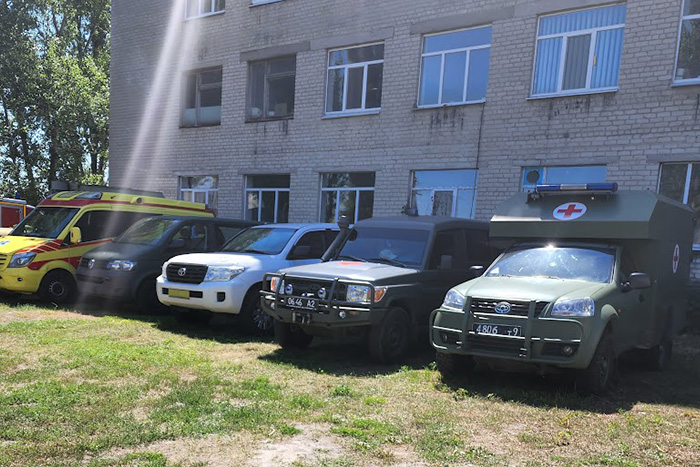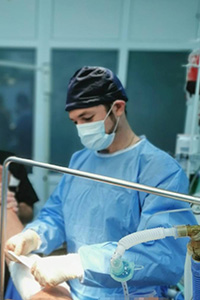Service Under Fire

by Frederick Barton '09

Lights flickered. The ground rocked. Glass from shattered windows covered the floor. Soldiers yelling orders and people screaming echoed through the night. Smoke wafted into the operating room. Hospital staff took cover wherever they could—under gurneys and surgical tables or in doorways. Meanwhile, my partner and I stood over the opened chest of our patient, unable to leave until we had stabilized him. Our security detail, a retired Italian special forces medic, instructed us to hurry up so that we would be available for the influx of wounded patients sure to come. The Russians had launched a missile strike that missed the hospital but struck an apartment building full of people across the street.
Hours later, while lying on my cot in an unused room in the facility, I couldn’t help but contemplate the twists and turns my life had taken that landed me in a war zone tending to people I did not know in a place I had never been. As an undergraduate student at Dickinson, I had a vague sense that I wanted to work for the State Department. I was drawn to history and took courses on the Arab-Israeli conflict because it was something I knew very little about other than it conjured extremely strong feelings in those around me. One class in particular, Conflict and Conflict Resolution, taught by former Associate Provost for Academic Affairs Shalom Staub, began to foster in me empathy for people I had never met embroiled in a conflict that did not affect me.
When I left Dickinson, I still didn’t know who I wanted to be when I grew up, only that I needed to serve my community in some way. I became a professional firefighter, paramedic, rescue swimmer and recovery diver and requested placement in the projects of Newport News, Va. Six years later, I returned to school to become an emergency nurse practitioner specializing in rural and austere medicine. I now spend my days traveling to remote areas of the country providing emergency care in places that cannot attract physicians.
When Ukraine was invaded in February, I felt drawn to the conflict. Here was an opportunity to render aid to those truly in need and, perhaps more important, to show Ukrainians that people across the world cared. I reached out to several organizations and was selected to join a single surgeon traveling to the front lines. It took five flights, two train rides, three cars, an ambulance and three days to reach eastern Ukraine. When I arrived, I learned that the medical staff was operating without any diagnostic devices, had no available labs for bloodwork and no specialists. The general surgeons triaged, performed emergency care and operated. None of them had had a break or been able to visit their families in six months. As such, I found myself, a nurse practitioner specializing in emergency medicine, operating in a war zone with rockets aimed at my facility.
While my expertise and the advanced equipment I brought were certainly utilized, it was my very presence that the Ukrainians appreciated the most. When I introduced myself to my patients as an American, they were so relieved to see that people whom they had never met, who had no ties to their nation, were willing to engage globally because it was the right thing to do. This is exactly what Dickinson taught me, and I am extremely proud to have been able to put it into practice. Slava Ukraini; Glory to Ukraine.
Frederick Barton ’09 (history) holds two master’s degrees in nursing from Columbia and Emory universities and completed a fellowship in rural emergency medicine at Virginia Tech. He is the Minnesota state representative for the American Academy of Emergency Nurse Practitioners. When not working, Fred likes to spend time mountain biking, caving, backpacking and generally trying to keep up with his Australian shepherd, Togo.
Read more from the winter 2023 issue of Dickinson Magazine.
TAKE THE NEXT STEPS
Published February 23, 2023